As an amateur scholar and die-hard enthusiast of everything to do with Alice in Wonderland, I have launched a podcast that takes on Alice’s everlasting influence on pop culture. As an author who draws on Lewis Carroll’s iconic masterpiece for my Looking Glass Wars universe, I’m well acquainted with the process of dipping into Wonderland for inspiration.
The journey has brought me into contact with a fantastic community of artists and creators from all walks of life—and this podcast will be the platform where we come together to answer the fascinating question: “What is it about Alice?”
For this episode, it was my great pleasure to have Craig Hanks join me as my guest on this episode! Read on to explore our conversation and check out the whole series on your favorite podcasting platform to listen to the full interview.

Frank Beddor
I’m impressed with your podcast, The Legendarium, and I had a great time on the show. The theme we talked about was why stories last. You guys take such a deep dive into amazing novels and works of literature. You do podcasts about authors, whether it's CS Lewis, J.R.R. Tolkien, or Robert Jordan. Then you have the Author’s Shelf series where authors come on and talk about the books that influence them. I'm interested in the imaginative moment where this all came together and you launched a podcast.
Craig Hanks
I've been going at this for a long time. I first started podcasting back in 2009 when I was working at the campus radio station where I went to school. I was one of those weirdo kids who, instead of turning on the TV, would turn on the oldies or the classic rock station because I loved the DJs. The music was amazing too but I loved hearing the DJs and fantasizing about being the guy with the microphone. Then I finally got a job in radio and went, “Oh, okay, there's no money in this. What else could I do?” So I started podcasting on the side while I was still in school but nothing really took off for a few years. It wasn't until we started The Legendarium back in 2014, that that thing started to crystallize. I had moved back to my hometown and rekindled my friendship with my best friend from elementary school.
We were brainstorming ideas and I said “I'd love to do something about fantasy and science fiction. A kind of a book club type of thing. Maybe we'd start with The Lord of the Rings.” He goes, “I've never read it.” Well, that settled that. So we did a deep dive, 17 episodes, on The Lord of the Rings. It’s the expert guy walking the first-timer through it. So we had an interesting dynamic there and then we started branching out. We read Brandon Sanderson and Robert Jordan and started getting into classic sci-fi, like Starship Troopers.

CH
It's all self-taught. When I was 15, I went and saw The Fellowship of the Ring with my family. I'd never seen it before. I've never read the books or anything. It was, as C.S. Lewis calls Lord of the Rings, a bolt from the blue from the clear sky. This was one of the few times in my life where, at that actual moment, I could feel that everything about my life had just changed. The screen goes black and Cate Blanchett says, “The world has changed.” I'm like, “Alright, that's it. I'm done. My life as I knew it was over. This is the greatest thing I've ever experienced.” From there, I bought the books and I did the teenage fan thing for a while, “How dare the movies make this change?”
FB
Even though you saw the movie first and you went back and read the books, then you started to critique the movie? Only a teenager can do that.
CH
Some people, unfortunately, never seem to grow out of it. But I was 16 or 17 when my mom bought me a copy of The Silmarillion. Anybody who's read The Silmarillion knows that is the true refiner’s fire for Tolkien fans. But again, I got to the last page and said, “My life will never be the same.” Then I started reading secondary stuff like Tom Shippey, the scholarly essays and works about The Lord of the Rings. I've been doing that for, gosh, 20 years now.
FB
I want to go back to between 2009 and 2014. I even noticed with the 20 episodes I've done, that I needed to refine this. I need to think about this more critically. I'm curious, from 2009 to 2014, before you landed on The Legendarium, what were some of the ideas that didn't work?
CH
The first show I ever did was actually with my wife. We were still in college and I was still at the radio station, where I was working as a producer. I was constructing episodes for this host to do something similar to what we're doing now. I would do all this research, feed him questions, and make him sound smart. It was a great job. I loved it. So I took it home, and asked my wife, “Hey, do you want to do a podcast with me? I don't know about me just talking into a mic. That sounds a little bit, you know, crazy.” It was a weekly podcast called The Weeklings. We had several recurring segments throughout the show. We had the story of the week, the Wiki of the week where we’d pull a random Wikipedia article. We did 15 or so episodes before she couldn't take it anymore. She did not like the back-and-forth confrontations and arguments that we'd have about this, and it stressed her out.
I'm pretty sure we had like 25 listeners and most of those were family. When I had the idea to start podcasting, I went to the campus library and, I kid you not, I picked up a copy of Podcasting for Dummies. It was beautiful. It walked me through the entire thing. Now there are a million resources online that'll take you through all the same kind of stuff. But it was perfect back in 2009 to get me set up, buy the equipment, and get on there.
FB
I'm really impressed with that. Because in 2009, it was way ahead of the curve. I went to a John Mulaney show recently at the Hollywood Bowl and at one point he looked out at all these people and said, “Oh, no, I know you all have a podcast. I'm not gonna listen to it.” I went, “Oh, man, I just started. I just had my second day and John Mulaney is making a joke about it.”
CH
Having a podcast used to be something people found interesting. When we started The Legendarium in 2014 the reaction was, “Oh, you have a podcast? Tell me more.” And now it's like, “Oh, you have a podcast.” I didn't know this until recently but somebody told me that on dating apps, if you say that you have a podcast, it's a huge red flag.
FB
How did you guys break out and establish yourself? One of the ways is by doing other people's podcasts, but there probably weren't that many podcasts when you started.

CH
Exactly. I don't think I guested it on a podcast until three or four years later. It was a while. When we started it was mostly little rinky dink operations like us or NPR putting out huge shows. When we moved on from our Tolkien series we had a couple hundred listeners. It was still pretty small. But when we moved on to Brandon Sanderson, we reached a whole new audience.
I'd been reading him for a long time so we started doing podcast episodes on his work. And I said, “You know what, nobody's listening to this because nobody knows it exists.” So I did the shameless self-promotion thing and got on Reddit, and told all the Brandon Sanderson fans. That is what blew it up. People were starved for content like this. They loved it. They loved having discussions on Reddit but now you could have somebody's voice in your ear, or several people talking about the things you loved. We had four people on the panel and it gives you that feeling of sitting in the living room with your buddies and they're talking about your favorite book.
FB
Were you always focused on such deep dives? The other thing that's unique in terms of what you guys talk about is the rereading of these books. Sometimes you guys reread these books four or five times, which seems insane to me. How do you have the time?
CH
Frank, we're dorks, okay? We're dorks. We've accepted it and it’s time for you to accept it too.
FB
In terms of when you're breaking down a story or a series or an author, were you getting feedback from listeners that let you expand your understanding of what was working with your podcast?
CH
It’s a great question and something that I stumbled into early on in those Reddit threads. It's a little tacky to go on and just say, “Here's a podcast, listen to it.” Even at the time, that was a little too self-promotional. So what I would do is say, “Hey, we're going to record a podcast about x book. What are your observations? Questions? What do you want us to talk about as we have this discussion?” So people would get engaged before the show came out. Then we put it out and they get to hear us ask their question. They get a thrill from that. And we still carry this through today but I think that was one of the things that helped build that core audience. When you do it right it’s not a gimmick. We weren’t doing it for self-promotion. It makes for much better conversations and much better episodes when you're engaging with the audience.
That would help us with individual episodes but also it got people used to the idea that these are guys who will actually respond and so listeners would suggest books for us. For the most part, it wasn't a popularity contest. We weren't tallying up votes for certain books or authors. It was more, “I've heard that name come up so many times that I think we need to put it on our list and we'll get to it at some point.” We’ve never chased the next big thing. Going back to your earlier question about rereading, generally speaking, there are two different types of readers - those who love to read widely and those who love to read deeply. I've always been a deeper reader. In fact, 450 episodes and dozens of authors are way too wide. For me, I would much rather just stick with one or two authors and really get into it for 500 episodes. That's my wheelhouse. But everybody has their own flavor of how they consume.
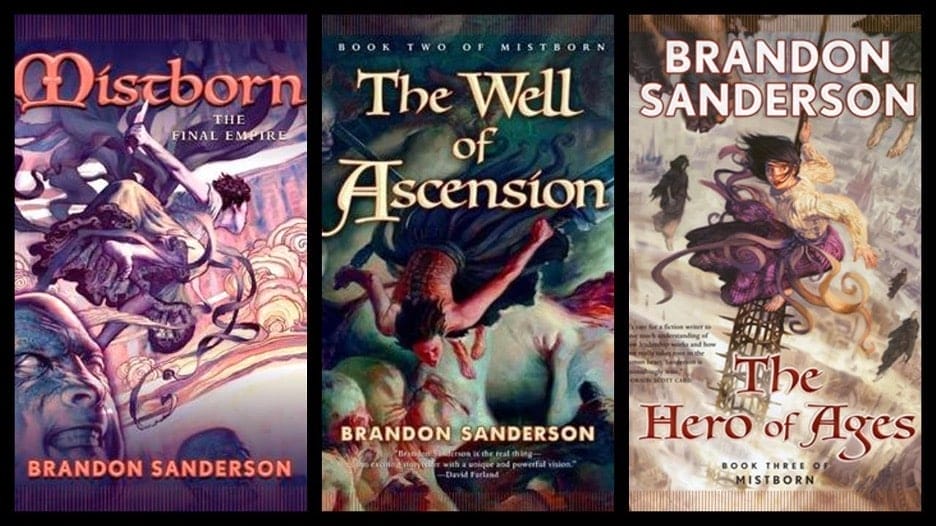
FB
Did Brandon Sanderson come on your show eventually?
CH
I've gotten to know Brandon Sanderson a little bit. I'm a beta reader for him now, which is a lot of fun. But anyway, he was our first Author’s Shelf episode. That’s where an author pulls something off their shelf that's not theirs. I got this idea because I was at a signing of his and I was asking for his help doing a little audio hit. I just wanted him to say into an audio recorder like, “Hi, this is Brandon Sanderson. Welcome to The Legendarium.” That's all I wanted.
So, I asked his assistant, “Can I get him to do this?” And the assistant said, “Yeah, he'll do it. But you have to wait till the end of the signing.” So as I stood there waiting, I was listening to the conversations he was having and I noticed that he had maybe 10-12 individual questions the whole time. He just got them dozens of times each. He was such a pro and he answered everybody with the same level of enthusiasm but I also had the thought, “If I ever had him on my show, I don't think I'd have anything interesting to ask him.” He's heard it all. He's had these questions 1,000 times.
So when I finally got him in front of the recorder and got the little audio hit, I said, “Hey, Brandon, we'd love to have you on the show.” And he got that look on his face, “Oh, no. How do I say no? I don't want to do some chump’s podcast.” But I said, “I'd love to have you on the show but I want to have you on to talk about something that's not your work.” And he goes, “Oh, tell me more.” I knew he was a Terry Pratchett fan and I said that we’d love to have him talk Pratchett. So that's where the Author’s Shelf started. I was just trying to find a different way to talk to authors and get to know them. We've all read the books and we all know their biographies. But how do they think about other books?
FB
What was the first book that your parents gave you that inspired you? I have two young kids and we went to a comic book shop one time and my son was engrossed in this Star Wars comic. At one point I said, “We have to go,” and he didn't look up. That was the moment he discovered story and reading. I think he might have been six or seven so I'm curious if you have a similar memory.
CH
I have two kids as well and I have a love-hate relationship with the Dave Pilkey books, Captain Underpants and Dog Man. I do not like reading them with my kids but I love that they love reading them. Anyway, when I was that age, six, seven, eight, I read all the Goosebumps books and the Hardy Boys stuff. That was great fun. Encyclopedia Brown holds a special place in my heart. But then very shortly after I turned nine, my mom came to me. I still can't believe she did this and handed me Sphere by Michael Crichton. So I read Sphere and loved it and then I got a copy from her of The Sword of Shannara by Terry Brooks.

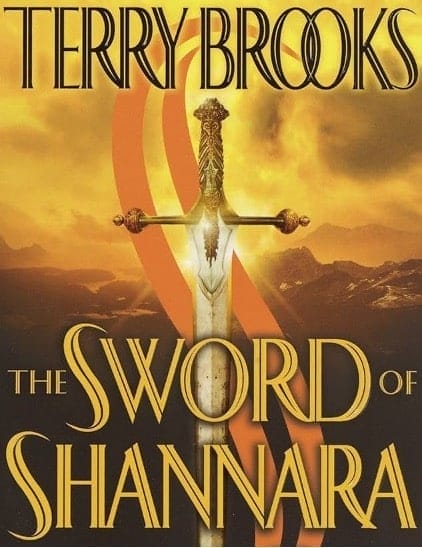
FB
But she was feeding you all sorts of different things.
CH
Those were the only two that my parents ever actually gave me telling me, “Here, you need to read this.” But what they did was they filled their bookshelves with all sorts of interesting-looking spines. Which is the great thing about sci-fi and fantasy. Love them or hate them, the covers are interesting.
FB
Boy, did I find out how important that is?
CH
With yours? Tell me more.
FB
At Comic Cons, there are so many distractions for people and a piece of artwork can get a kid's attention. I could see them coming, beelining right towards me. It’s gotta be that card soldier right up there. And they go, “What are those things? What are those, knights?” It became abundantly clear why having great art and great covers are important and fantasy and sci-fi do it better than anybody,
CH
The titles as well. This is why authors don't always get to choose their titles. Just like somebody who writes online, it's often the editor who chooses the title. When I was 14, my friend tried to hand me a copy of The Lord of the Rings. I hated the cover. I hated the title. I'm not touching that. You keep your stupid book.
FB
Little did you know. So what motivated you to finally read it?
CH
It was that first peek at Peter Jackson's trilogy.
FB
Did you put those two things together and remember that book?
CH
Yep. I don't know why that particular story stuck in my head, maybe because I was being kind of a jerk to my friend. But when I was a little younger, 12 or 13, I read The Hobbit for a book report in school. I enjoyed it but I had no idea that this guy had written anything else. And so yeah, sure, I read this thing about a hobbit. So when I was watching The Fellowship of the Ring in theaters and Bilbo finds the ring in the prologue, I was so confused because I've seen this before. It was killing me. It took me four or five minutes before it finally clicked into place.
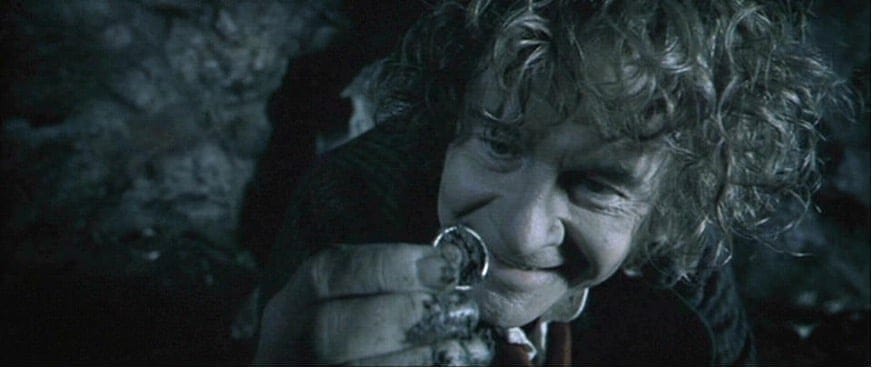
FB
That was one of the kind of great openings for a movie in terms of laying out the story and the backstory and the narration and the battles and they did it with so much grace and economy and then you land right in a character, but you have context. I remember that opening really well and being blown away.
CH
It’s under-appreciated that when you come to a story, it matters. It matters as much as who you are and what it is. And not just at what age, but what day. How excited are you? How depressed?
FB
Well, it certainly was true for me with Alice in Wonderland, because I came to Alice when I was 10. My grandmother's name was Alice. It was my mother's favorite book. And they handed this book to me and I looked at the cover and said “There's no way. Come on, mom. She has a blue dress and she goes down a rabbit hole? This is going to be terrible.” And of course, I hated it. So I told her later in life that when I started writing The Looking Glass Wars, this was my revenge for her forcing me to read the original book. It wasn't until college that I reread Alice and that I really, really appreciated it and found my way into the world,
So our lives with these two different books are somewhat parallel. I wish there had been a good Alice in Wonderland movie. The Lord of the Rings is the gold standard for the reluctant hero story, the quest story, and Alice is on a bit of a quest, but it's also random and episodic and, so unlike Lord of the Rings, you know, it was a struggle to find a structure to tell that story, certainly as a movie, except for Disney’s version and, of course, Tim Burton found his way and he brought his fantastical vision to it. But The Lord of the Rings really defined the reluctant hero story.
CH
It's defined a lot about modern fantasy. But some people do have a tendency, especially when they're younger, to think that fantasy started with Tolkien in 1938. It didn't. Fantasy was going on for a long time. It just had a different form. It wasn't structured the same way. So you had people like L. Frank Baum or George MacDonald writing fantastical things. It just had a different flavor and a different purpose.
FB
And Lewis Carroll. Wonderland has now been defined as a magical place. There's Winter Wonderland and Middle Earth is also equally recognizable as a fantasy realm that in some ways can feel very real and is often referenced in culture these days, which I find really interesting. But I'm a big L. Frank Baum fan because I think all authors named Frank are excellent.
CH
Something that Tolkien did usher in, as far as what he gave the fantasy genre, there are many things, but one of them is a grounding in reality. When you're reading Alice in Wonderland and you fall down that rabbit hole, or when you go to the magical land of Oz, all bets are off. You have no idea what's up or down, left or right. Everything is kind of randomized, almost. It's a fever dream. Whereas when you get to Tolkien, he bases Middle-earth on some imagined pre-history of our world. So when I lived for a couple of years in northern France, I was amid these rolling hills with the corn and these yellow flowers and green hills. I am in the Shire. I am right there. It is exactly as he described it. It’s that kind of grounding that you then have with Westeros. He’s basing it on the Wars of the Roses and this idea of the British Isles and what's across the sea and these strange peoples that you come in contact with. It's grounded in reality. Then, if we go back to Terry Brooks, he did a post-apocalyptic fantasy where it's our world, but it’s what happens 1000s of years after the nuclear winter. It's something that Tolkien did usher in, making it our world but fantastical.
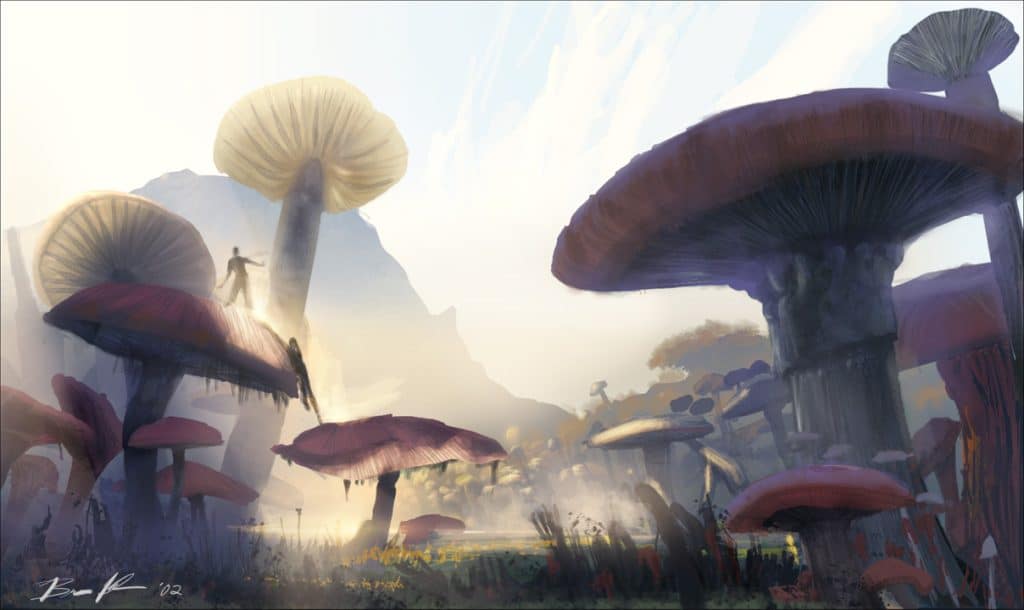
FB
That trope has been so successful. I was certainly inspired when writing my books to find a way to ground Wonderland and bring rules, logic, and history to the elements of visual aspects that people were familiar with. So the Valley of Mushrooms becomes a real place, a destination, and there are rules. The more I was able to ground the story in something that felt real for people, the more they could suspend disbelief and go on the ride. Then I expanded it again, using maps and other territories that were never part of Lewis Carroll's original work. So having those worlds as potential settings or just referencing them gave the story a broader context and different mythologies to play off of. Falling down a rabbit hole, and having a portal is a trope from C.S. Lewis, but the palace intrigue is a trope and a genre that works if you can find yourself grounded in the rules and the logic. I love that about Tolkine’s books. He just went so deep and spent so much time crafting his world.
CH
He was a special creature in the way his mind worked. But also, he was writing The Lord of the Rings for 15-17 years. It took him a long time to just write the book. It took him his whole life to construct the mythology around it.
FB
I'm always interested in people's experiences with their parents and how their parents influenced and shaped them. When you have this much love for literature, pop culture, and movies, finding a way to make a career out of that is really unusual and not often encouraged in society. How did you navigate that? What did your folks have to say, or anybody else? Was there a mentor who might have influenced you?
CH
I will say, as delighted as I am with a decade of relative success with The Legendarium, this is not my full-time job. This is still largely a labor of love. But going back to your actual question, as far as my parents, I had a couple of advantages in that regard. Number one, they were accepting of whatever path we might want to take. That was never really a question. There was never a “Hey, you should go into pre-law.” Nobody ever said that to me in my house. So that was advantage number one. Then advantage number two is that I'm a middle child. I've got two older brothers and a younger sister, and all the middle children out there will know that you get largely forgotten in the mix. This is the middle child thing. I didn't have that push that I think some kids might have had of, “You need to do this. I'm going to help you direct your life.” I just never had that. I’m sure a therapist out there would have a lot to say about this but as far as this conversation goes, it was quite an advantage. Because it let me cultivate just the stuff that I loved and not only what I thought I had to do.
FB
I wanted to ask, why no Alice in Wonderland on your podcast?
CH
It’s one of those things that, should we do it? Yeah, absolutely. Will we do it? Yeah, probably one day. It’s just that the “to be read” pile grows apace. It’s tough. We have to balance what’s new and interesting with what we want to read regardless of when they came out.
FB
Have you read Alice before?
CH
I was so young that I can't remember. I think I read it when I was 12. It’s one of those things where you have flashes in images. Kind of like my remembering who Gollum was, “Wait a minute, I've seen this somewhere.” That's what I have with Alice.
FB
Since I've been working in the Alice world it's kind of like you buy a Prius and suddenly you look around and everybody has a Prius. It's like, “I can't believe how many Priuses are here.” Alice seems to be everywhere in pop culture because I'm focused on it. In the last political cycle, you heard down the rabbit hole countless times. Then after our podcast, I was thinking about Lord of the Rings and how you have the books and the movies and the video games but there are also so many excellent games, the television show, and there are a lot of musicians that have been inspired by Tolkien, like Led Zeppelin, which was my childhood favorite. From your perspective, how much influence is there of The Lord of the Rings in culture today and why does it last? Why do those themes seem to be resonating now more than ever?
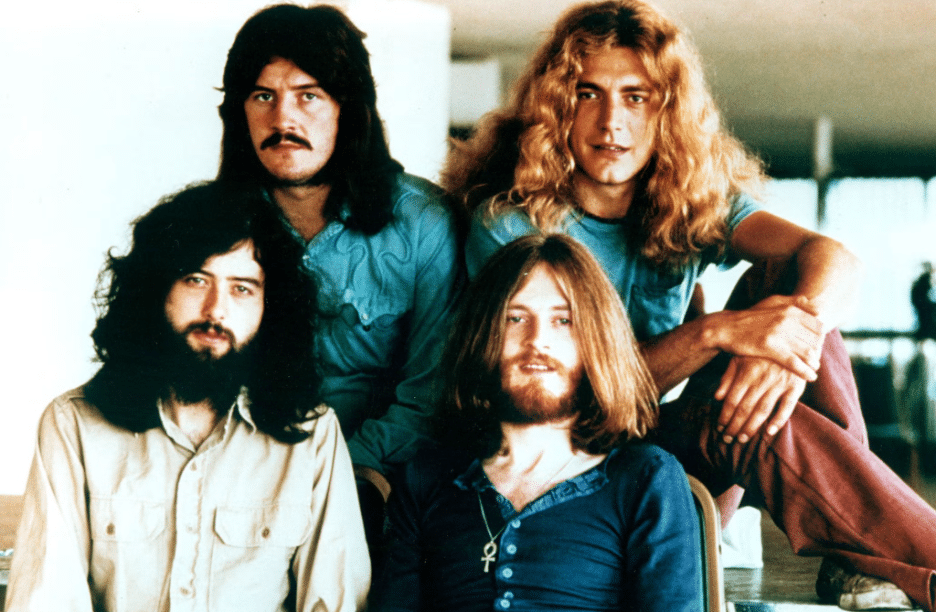
CH
As far as what we see around us, The Lord of the Rings has become, especially after the movies, the water we swim in but we don’t know we’re wet. So we see stuff and maybe it's so familiar that we may or may not remark on it. There’s the old trope of the wayfaring traveler stopping by an inn. You have the Ringwraiths, one of Tolkien's most original contributions to the genre, this idea of the twisted evil that used to be human and now serves the Dark One. This is a super common storytelling device now. I'm trying to think if there are things about it that we use daily like the phrase “down the rabbit hole”. I'm not entirely sure that we have that style of thing with The Lord of the Rings.
FB
Is the line, “My precious,” from the book or the movie?
CH
It's from both but when Andy Serkis is saying it, it does something a little different. It gives you that living meme in your head.
FB
I think “one ring” too but not to the level of “down the rabbit hole.” “Down the rabbit hole” is the reason Alice in Wonderland is the second most quoted book in the world.
CH
You can read those huge lists of words and phrases that we still use from Shakespeare. I don't think we do that with The Lord of the Rings. Although, everybody knows what a hobbit is. If you were to list magical creatures, you have elves and dwarves and ogres and orcs and hobbits. Tolkien invented hobbits out of whole cloth. I was actually just playing one of The New York Times word games and hobbit was one of the answers. I was like, “No way. Great!” So that's in the dictionary now. We might have a little thing here and there.
FB
But I think the grand quest and the themes of resilience and friendship and good and evil, it feels like so much of that started with The Lord of the Rings.
CH
I think you might be right, as far as pop culture goes. But one of the wonderful things about Tolkien is that he never regarded his books and his world as an endpoint. They’re jumping off points. If anybody's interested in reading a Tolkien short story, it's about 20 pages long and it will change your life. It's called “Leaf by Niggle”. Niggle is a reflection of Tolkien himself and it's a story of meditation on death and life and what happens in the afterlife. The whole idea behind this story was that the painting that Niggle was creating, which mirrored Tolkien's story, his mythology, comes to life in purgatory, and it's his job to bring it to life and it becomes a waystation for other souls on their way from life into the afterlife. That's how I think, at least at that point in his life, he viewed what he was building. When I say that what I mean is, he never wanted you to get lost in Middle-earth. He wanted you to use it to be inspired to go back to the real world and think about things differently. So when a reader comes to The Lord of the Rings with a certain type of mindset and a certain thirst for knowledge, you get out of Middle-earth and go, “Where did that come from?” And if you just scratched the surface a little you’d see that you should read Beowulf, the Icelandic Eddas, the Kalevala from Finland, and German fairy tales. It sends you, if you'll excuse me, down a rabbit hole. It sends you off on an adventure to all these other things that are part of our world.
My favorite secondary writer on Middle-earth is Tom Shippey. He wrote J.R.R. Tolkien: Author of the Century and The Road to Middle-Earth, these kinds of intellectual treatises on Middle-earth and Tolkien. What I appreciated about that was that he gave endnotes, he gave suggestions on what to read next. He’s somebody who can crystallize ideas. Like, where did this reluctant hero come from? Tolkien didn't invent that. Where did the idea of courage in our stories come from? He didn't invent that, he just gave it to us and said, “If you want to learn more about this, I base the Rohirrim on the Anglo-Saxons, the old English, go read Beowulf.”

FB
It’s the handing down of stories, which I think is so important. I'm getting a little bit lost with what we have in social media. I was listening to somebody talk about social media and he had a graph that showed every month of your life from 18 to 90 and he showed that if you stay on social media, this is how much time you would have wasted on social media. But then more importantly, he goes back to the difference between social media being a 15-second interaction as opposed to when books were the main form of entertainment, you had to focus and you would sink into a world and go on an adventure. You'd have to absorb so much of the world to get enjoyment from it. I fear that we’ve lost some of that. So hearing what you're talking about in terms of these books being a waystation is a great way of conceptualizing that experience of finding other stories and other authors.
CH
One of the most wonderful and infuriating things about the internet is that it's simultaneously forever and utterly fleeting. So, when I'm finally done with The Legendarium, I'll take all of the audio files, put them on a thumb drive, and save them for posterity. Then, in the future, people will look at the thumb drive and go, “How the heck am I supposed to read this?” But I have no such grand ambitions. I do love the idea of helping other people love the books that they love. There's something about sharing those books with others, whether I'm the one talking into the microphone with my friends in the studio or if you're the one listening on your headphones, there's something about experiencing it with other people and hearing other perspectives that can really solidify what you love.
FB
There are so many great books. I’ve encountered so many over the years at Comic Cons. You must know this, but they have a great one in Salt Lake City. I used to think it was just for comic books but they love all things to do with pop culture, particularly novels.
I remember when I first started going to cons, I was telling Penguin, my publisher, “I sell more novels at Comic Cons than comic books. You guys should have a booth here. You guys should be promoting your authors at Comic-Con.” And they took my advice.
CH
It's remarkable. When you go down Artist Alley at a Comic Con you see there is often a lot of fan art based on their favorite books and it sells like freakin’ hotcakes.
FB
It's terrific. Tell me about the book you’re covering on your latest podcast.
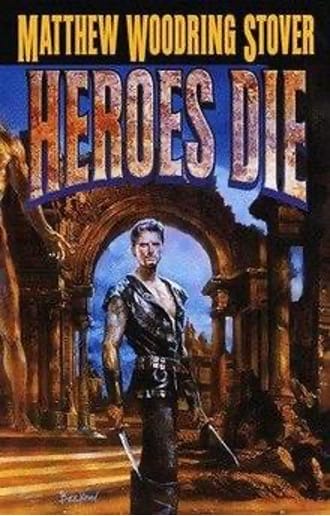
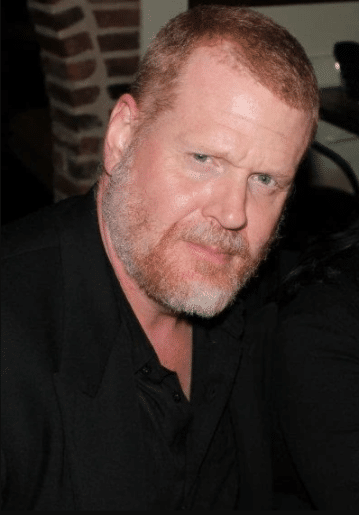
CH
It’s The Acts of Caine series by Matthew Stover. The first book is called Heroes Die. I urge everyone listening to Google Heroes Die and check out the cover. It is, without a doubt, the worst cover I have ever seen in my life. The mid to late-90s was the nadir of fantasy cover art and this one takes the cake. But it is a remarkable book. The Acts of Caine is a four-book series and each one varies in length. He uses a different tone and style in each one. He has different themes that he tries to capture within each book. They’re wildly different, unlike most of the series that we tend to read and love. It’s like listening to an album by Beck. You never know what the next track is gonna bring you. So the book is Heroes Die and the series is called The Acts of Cain. The first episode is out so people can go check that out. I highly, highly recommend it. I'm actually doing this in conjunction with the Inking Out Loud podcast. The host, Drew McCaffrey, and I are going to be swapping back and forth, doing one episode on mine, the next on his, and vice versa.
FB
That's a cool idea. What’s the emphasis of his podcast?
CH
He does a similar thing to what we do on The Legendarium. It's a book club-style podcast. He's a writer himself as yet unpublished but it's only a matter of time. He's very good. So he comes at it from a writerly perspective. Whereas I tend to come at it from, shall we call it, a readerly perspective.
FB
Have you thought about writing?
CH
It is something that I've considered for sure. I have a few ideas bouncing around in my head. But I am not sure if I have the discipline to carry it through. I admire people like you who can even finish a book, let alone get it published and get thousands and millions of people to read it. But it’s something that I've thought about a lot over the years because I've got this question a lot, “Hey, you talk about books all day. Why don't you write one?” So maybe I should, at some point. But also, I think while writing is a talent that can be cultivated, so is reading. And right now I am happy to continue cultivating that talent and trying to get better at it.
FB
To be able to break down those stories and share them as you do in the podcast is definitely a talent. I remember listening to some of your podcasts before I came on and I thought it was really intimidating. I do not want to get into a deep discussion about some of these books because that is not how I process my creativity. I have to go deep into my world and then hope that these influences show up. But I can't be thinking about other books or other writers. I have to think, “Is this a nice sentence? Is this a decent paragraph? Does this make for a good end to the chapter?” I was listening to you dissect some of these novels, it was really impressive. I really encourage people to listen to your podcast. It's tons of fun. Obviously, you've done it 450 times so you know what you're doing and you have a great radio voice as well.
CH
I appreciate that. When I got hired at the radio station at 21 or 22, I was told that I would never be on the air and that my voice was terrible.
FB
Yes, I love that. Because it speaks to that thing about being rejected and failing and then finding your way and how satisfying it is to overcome that rejection and find something you love.
CH
The thing I love about The Legendarium and the reason why I keep doing it, there are a lot of reasons but this is one of the big ones, is it opens doors. It lets me meet people like you. It sends me to this or that convention. It provides opportunities. At the beginning of the show I had been working in a bank for four years and I got to talking to one of my customers. I invited her on the podcast and that’s how I got a job in marketing and how I ended up doing other podcast projects and YouTube channels. If you do what you love, it may not make you rich, but it can open doors and lead you to meet people.
FB
I really love that story. It is following your passion and trusting that those doors will open and doing the work. It's been a real pleasure and thank you for sharing your love of all things Tolkien. I look forward to maybe catching you at a Comic Con in the future.
CH
Oh, absolutely. Thank you so much for having me, Frank.
For the latest updates & news about All Things Alice, please read our blog and subscribe to our podcast!